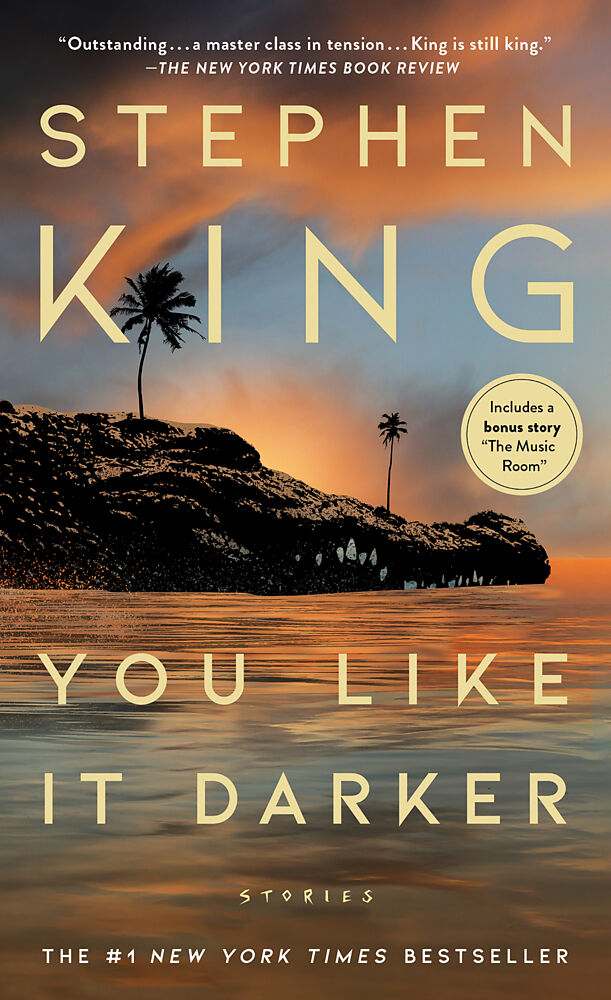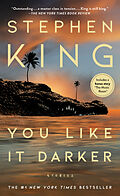

You Like It Darker
Beschreibung
NAMED A NEW YORK TIMES BOOK REVIEW TOP 10 HORROR BOOK OF 2024 WINNER OF THE GOODREADS CHOICE AWARD FOR HORROR FINALIST FOR THE 2025 LOCUS AWARDS "Stephen King knows You Like It Darker and obliges with sensational new tales" (USA TODAY): From legendar...Format auswählen
- Kartonierter EinbandCHF 11.50
Wird oft zusammen gekauft
Andere Kunden kauften auch
Beschreibung
NAMED A NEW YORK TIMES BOOK REVIEW TOP 10 HORROR BOOK OF 2024
WINNER OF THE GOODREADS CHOICE AWARD FOR HORROR
FINALIST FOR THE 2025 LOCUS AWARDS
"Stephen King knows You Like It Darker and obliges with sensational new tales" (USA TODAY): From legendary storyteller and master of short fiction Stephen King, an extraordinary collection of stories that are "a master class in tension and full of King's dark humor" (The New York Times Book Review)-now with a bonus story, "The Music Room."
"You like it darker? Fine, so do I," writes Stephen King in the afterword to this magnificent new collection of twelve stories that delve into the darker part of life-both metaphorical and literal. King has, for half a century, been a master of the form, and these stories, about fate, mortality, luck, and the folds in reality where anything can happen, are as rich and riveting as his novels, both weighty in theme and a huge pleasure to read. King writes to feel "the exhilaration of leaving ordinary day-to-day life behind," and in You Like It Darker, readers will feel that exhilaration too, again and again.
"Two Talented Bastids" explores the long-hidden secret of how the eponymous gentlemen got their skills. In "Danny Coughlin's Bad Dream," a brief and unprecedented psychic flash upends dozens of lives, Danny's most catastrophically. In "Rattlesnakes," a sequel to Cujo, a grieving widower travels to Florida for respite and instead receives an unexpected inheritance-with major strings attached. In "The Dreamers," a taciturn Vietnam vet answers a job ad and learns that there are some corners of the universe best left unexplored. "The Answer Man" asks if prescience is good luck or bad and reminds us that a life marked by unbearable tragedy can still be meaningful.
"King's skills as a storyteller remain undimmed" (The Minnesota Star Tribune) and his ability to surprise, amaze, and bring us both terror and solace is unsurpassed. "The titular darkness promised is as riveting and all-consuming as ever" (New York magazine). You like it darker? You got it.**
Autorentext
Stephen King is the author of more than sixty books, all of them worldwide bestsellers. His recent work includes Never Flinch, the short story collection You Like It Darker (a New York Times Book Review top ten horror book of 2024), Holly (a New York Times Notable Book of 2023), Fairy Tale, Billy Summers, If It Bleeds, The Institute, Elevation, The Outsider, Sleeping Beauties (cowritten with his son Owen King), and the Bill Hodges trilogy: End of Watch, Finders Keepers, and Mr. Mercedes (an Edgar Award winner for Best Novel and a television series streaming on Peacock). His novel 11/22/63 was named a top ten book of 2011 by The New York Times Book Review and won the Los Angeles Times Book Prize for Mystery/Thriller. His epic works The Dark Tower, It, Pet Sematary, Doctor Sleep, and Firestarter are the basis for major motion pictures, with It now the highest-grossing horror film of all time. He is the recipient of the 2020 Audio Publishers Association Lifetime Achievement Award, the 2018 PEN America Literary Service Award, the 2014 National Medal of Arts, and the 2003 National Book Foundation Medal for Distinguished Contribution to American Letters. He lives in Bangor, Maine, with his wife, novelist Tabitha King.
Leseprobe
Two Talented Bastids TWO TALENTED BASTIDS 1
My father-my famous father-died in 2023, at the age of ninety. Two years before he passed, he got an email from a freelance writer named Ruth Crawford asking him for an interview. I read it to him, as I did all his personal and business correspondence, because by then he'd given up his electronic devices-first his desktop computer, then his laptop, and finally his beloved phone. His eyesight stayed good right up to the end, but he said that looking at the iPhone's screen gave him a headache. At the reception following the funeral, Doc Goodwin told me that Pop might have suffered a series of mini-strokes leading up to the big one.
Around the time he gave up his phone-this would have been five or six years before he died-I took early retirement from my position as Castle County School Superintendent, and went to work for my dad full-time. There was plenty to do. He had a housekeeper, but those duties fell to me at night and on the weekends. I helped him dress in the morning and undress at night. I did most of the cooking, and cleaned up the occasional mess when Pop couldn't make it to the bathroom in the middle of the night.
He had a handyman as well, but by then Jimmy Griggs was pushing eighty himself, and so I found myself doing the chores Jimmy didn't get around to-everything from mulching Pop's treasured flowerbeds to plunging out the drains when they got clogged. Assisted living was never discussed, although God knows Pop could have afforded it; a dozen mega-bestselling novels over forty years had left him very well off.
The last of his "engaging doorstoppers" (Donna Tartt, New York Times) was published when Pop was eighty-two. He did the obligatory round of interviews, sat for the obligatory photos, and then announced his retirement. To the press, he did so graciously, with his "trademark humor" (Ron Charles, Washington Post). To me he said, "Thank God the bullshit's finished." With the exception of the informal picket-fence interview he gave Ruth Crawford, he never spoke for the record again. He was asked many times and always refused; claimed he'd said all he had to say, including some things he probably should have kept to himself.
"You give enough interviews," he told me once, "and you are bound to stick your foot in your mouth a time or two. Those are the quotes that last, and the older you are, the more likely it becomes."
Yet his books continued to sell, so his business affairs continued. I went over the contract renewals, cover concepts, and the occasional movie or TV option with him, and I dutifully read every interview proposal once he was incapable of reading them himself. He always said no, and that included Ruth Crawford's proposal.
"Give her the standard response, Mark-flattered to be asked, but no thanks." He hesitated, though, because this one was a little different.
Crawford wanted to write a piece about my father and his long-time friend, David "Butch" LaVerdiere, who died in 2019. Pop and I went to his funeral on the West Coast in a chartered Gulfstream. Pop was always close with his money-not stingy, but close-and the whopping expense of that roundtrip said a lot about his feeling for the man I grew up calling Uncle Butch. That feeling held strong, although the two men hadn't seen each other face to face in ten years or more.
Pop was asked to speak at the funeral. I didn't think he would-his rejection of the public spotlight spread in all directions, not just interviews-but he did it. He didn't go to the podium, only stood up where he was with the help of his cane. He was always a good speaker, and that didn't change wit
